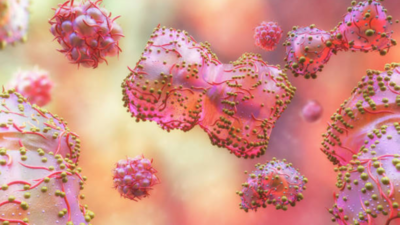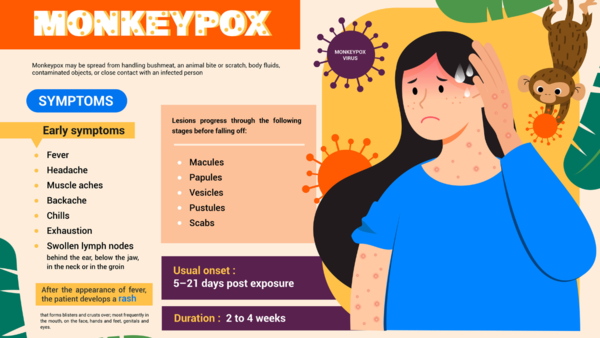- News
- lifestyle
- health-fitness
- health-news
- Monkeypox in India: Suspected case identified; key symptoms exclusively seen in this infection
Trending
Monkeypox in India: Suspected case identified; key symptoms exclusively seen in this infection
India's first suspected monkeypox case has emerged in Delhi following its declaration as a global health emergency. The patient is currently isolated and stable while awaiting test results. Symptoms typically include rashes, fever, and muscle aches. Authorities are actively conducting contact tracing to manage the situation and mitigate potential risks effectively.

India's first suspected case related to monkeypox has been identified in the national capital of Delhi. This is the first case in the country after monkeypox was declared a global health emergency.
As per the Union Health Ministry, the patient has been put under isolation in a designated hospital and is currently stable. The samples from the patient are being tested to confirm the presence of Mpox.
So, what are the signs that confirm that a person has been infected by monkeypox virus?
The common signs of monkeypox are rashes, fever, sore throat, headache, muscle ache, back pain, fatigue and swollen lymph nodes. 
Once the symptoms start, it stays for 2-4 weeks. But in people who have a weak immune system, the symptoms will last for longer.
Usually rashes are the first symptoms of the monkeypox infection; however, many individuals experience fever, muscle aches or sore throat as the first signs. Rashes are seen on the palm, soles, face, mouth, throat, genital areas and anus.
The best way to detect monkeypox virus infection is by polymerase chain reaction (PCR). The specimens are taken from the rashes and in the absence of the skin lesions the swabs are taken from the throat or the anus. Blood testing is not recommended to detect the monkeypox virus.

Usually other tests like HIV, varicella zoster virus (VZV), syphilis and herpes are also recommended.
Monkeypox can spread through human contact, which makes contact tracing necessary to contain the spread of the disease. In the suspected case of monkeypox in India, the health ministry is in contact tracing to identify potential sources and assess the impact within the country. It further asserted that the country is fully prepared to deal with such isolated travel-related cases and has robust measures in place to manage and mitigate any potential risk.
To stay safe from monkeypox it is advisable to wear a mask, wash hands often with soap and water, and use hand sanitizer. People who are infected should keep the skin dry and uncovered during isolation, rinse mouth with saltwater to reduce sores, take warm baths and avoid popping the blisters or scratching sores or shave the areas with sores.
As per the Union Health Ministry, the patient has been put under isolation in a designated hospital and is currently stable. The samples from the patient are being tested to confirm the presence of Mpox.
So, what are the signs that confirm that a person has been infected by monkeypox virus?

The symptoms begin within a week of exposure, but in some individuals it can take up to 21 days for the symptoms to show.
Once the symptoms start, it stays for 2-4 weeks. But in people who have a weak immune system, the symptoms will last for longer.
Usually rashes are the first symptoms of the monkeypox infection; however, many individuals experience fever, muscle aches or sore throat as the first signs. Rashes are seen on the palm, soles, face, mouth, throat, genital areas and anus.
The best way to detect monkeypox virus infection is by polymerase chain reaction (PCR). The specimens are taken from the rashes and in the absence of the skin lesions the swabs are taken from the throat or the anus. Blood testing is not recommended to detect the monkeypox virus.

Usually other tests like HIV, varicella zoster virus (VZV), syphilis and herpes are also recommended.
Monkeypox can spread through human contact, which makes contact tracing necessary to contain the spread of the disease. In the suspected case of monkeypox in India, the health ministry is in contact tracing to identify potential sources and assess the impact within the country. It further asserted that the country is fully prepared to deal with such isolated travel-related cases and has robust measures in place to manage and mitigate any potential risk.
To stay safe from monkeypox it is advisable to wear a mask, wash hands often with soap and water, and use hand sanitizer. People who are infected should keep the skin dry and uncovered during isolation, rinse mouth with saltwater to reduce sores, take warm baths and avoid popping the blisters or scratching sores or shave the areas with sores.
End of Article
FOLLOW US ON SOCIAL MEDIA









